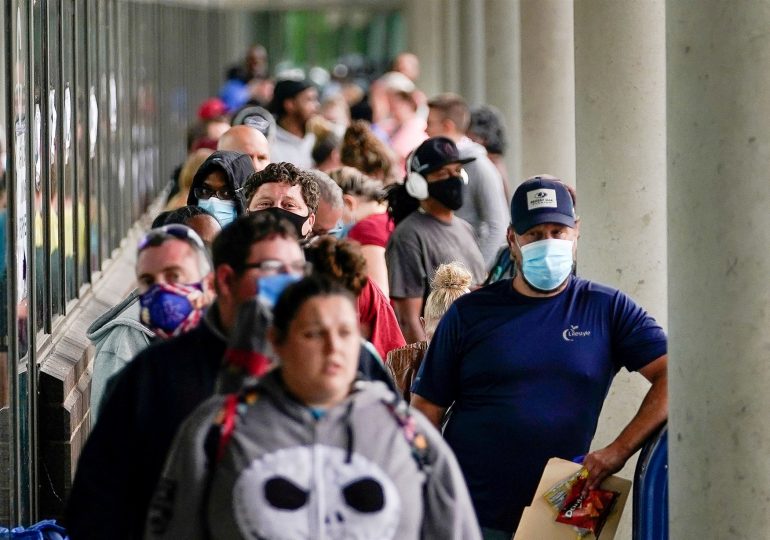Losing a job triggers feelings of worry and inadequacy at the best of times, and living in a rapidly worsening pandemic is subjecting people to new and pervasive stressors. As Covid-19 cases surge, experts say, the mental health of millions of unemployed Americans is at risk.
“There is already a lot of stress and anxiety due to Covid-19, and everyone’s worried about their health and the health of their loved ones, so to put an unemployment crisis on top of an already difficult, stressful time — I think it’s pushing the edge of what people are able to handle,” said Ofer Sharone, an associate professor of sociology at the University of Massachusetts Amherst.
Even in normal recessions, experts say, prolonged job loss is an under-the-radar mental health crisis that can sap people’s confidence and sense of identity.
“There’s only so many rejections you can take before your self-esteem and confidence take a beating,” said Maria Heidkamp, director of the New Start Career Network at Rutgers University. “There’s also emotional trauma, the physical and mental health challenges that impact the well-being of these individuals.”
Donovan Vogel can identify. Vogel, 27, estimated that he applied for “definitely hundreds” of jobs and participated in about 50 interviews since he lost his position at a Philadelphia-area insurance agency in February.
Vogel begins a new job this month, but his extended stretch of joblessness, combined with a processing error that delayed his receipt of unemployment benefits by months, took such a toll on his mental health that he sought professional help.
“There were still times where I was definitely anxious and stressed, trying to figure out how I was going to allocate money,” he said. “I was going and seeing a therapist once a week.”
The mentally and emotionally taxing experience makes it harder for people to re-enter the workforce, Heidkamp said. “These things impact individuals’ executive functioning. … That kind of stress is detrimental to people’s ability to do a successful job search.”
On top of triggering the worst job market collapse since the Great Depression, Sharone said, the ongoing — and increasingly dire — public health catastrophe of the pandemic also makes people feel that their plight is insignificant. “They felt unable to share how hard it is with others who aren’t experiencing it,” he said. “Even if people recognize there’s some larger pattern going on, it’s still hard not to blame yourself.”
Social distancing protocols and restrictions on gatherings — especially as winter comes — mean that both traditional networking mixers and less formal get-togethers aren’t taking place. “You can’t go and hang out with a group of people in your field,” Sharone said, which makes searching for a job harder and increases the isolation many people are facing.
Career coach Roy Cohen said: “I do worry about my clients. It feels a bit like musical chairs now. It’s reached a point where there are just fewer opportunities. Because we don’t know when the pandemic is going to lift, a lot of companies are reluctant to bring up headcount.”
Running out of money is the biggest fear, and Cohen said many of his clients have been preoccupied with it. “Will they be able to retire? Will they have enough resources to support a retirement? It feels like a moving target for many of them,” he said.
Michele Evermore, senior researcher and policy analyst at the National Employment Law Project, said, “We are definitely coming up on a retirement crisis that is going to be much worse due to this pandemic and plan leakage.”
Sharone said: “They’re very stressed by seeing their retirement savings they’ve, in some cases, spent decades building up. Their sense of how they’re going to survive in retirement is a huge source of stress.”
For Tami Marks, that means having to sell her Mesa, Arizona, home to stay afloat. Marks, 48, lost her job in the nonprofit sector at the end of March and hasn’t been able to land a new position. Her husband’s retirement gig doesn’t bring in enough money to cover the bills, and the $240 weekly unemployment payment she has been collecting “barely puts food on the table,” she said.
“I’ve gotten to the point where I’ve applied at Target and Michael’s for seasonal jobs, just to have a job,” Marks said, but she is finding that, with so many people out of work, competition is fierce. “I don’t even get callbacks for those,” she said.
With her retirement fund already liquidated and tapped out, Marks said, she and her husband had no choice but to move — a wrenching decision made all the more painful when she reflected on how the move would affect her youngest child, who has special needs and whose care has already been disrupted by the family’s financial crisis.
Download the NBC News app for full coverage of the coronavirus outbreak
“Our 12-year-old has autism, so it’s been a struggle to keep him on his meds,” Marks said.
“He should be in therapy, but we can’t do it,” she added, saying that her own fibromyalgia was aggravated by the stress.
“There’s nights I sit down and I lose it,” she said. “Right now, starting to pack up my house that I didn’t plan on selling for at least a few more years is tough.”
Leave a comment









